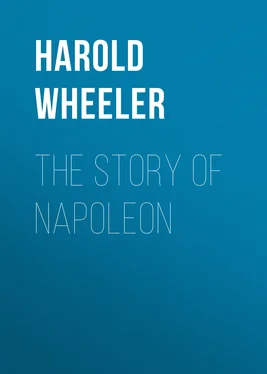Harold Wheeler - The Story of Napoleon
Здесь есть возможность читать онлайн «Harold Wheeler - The Story of Napoleon» — ознакомительный отрывок электронной книги совершенно бесплатно, а после прочтения отрывка купить полную версию. В некоторых случаях можно слушать аудио, скачать через торрент в формате fb2 и присутствует краткое содержание. Жанр: foreign_prose, История, foreign_edu, foreign_antique, на английском языке. Описание произведения, (предисловие) а так же отзывы посетителей доступны на портале библиотеки ЛибКат.
- Название:The Story of Napoleon
- Автор:
- Жанр:
- Год:неизвестен
- ISBN:нет данных
- Рейтинг книги:4 / 5. Голосов: 1
-
Избранное:Добавить в избранное
- Отзывы:
-
Ваша оценка:
- 80
- 1
- 2
- 3
- 4
- 5
The Story of Napoleon: краткое содержание, описание и аннотация
Предлагаем к чтению аннотацию, описание, краткое содержание или предисловие (зависит от того, что написал сам автор книги «The Story of Napoleon»). Если вы не нашли необходимую информацию о книге — напишите в комментариях, мы постараемся отыскать её.
The Story of Napoleon — читать онлайн ознакомительный отрывок
Ниже представлен текст книги, разбитый по страницам. Система сохранения места последней прочитанной страницы, позволяет с удобством читать онлайн бесплатно книгу «The Story of Napoleon», без необходимости каждый раз заново искать на чём Вы остановились. Поставьте закладку, и сможете в любой момент перейти на страницу, на которой закончили чтение.
Интервал:
Закладка:
The echo of the Revolution had been heard in far-off Corsica; there were disturbances, and serious trouble seemed likely, as soldiers were on the move intent upon restoring the sway of the hated royalist authorities. Napoleon called a meeting of patriots, harangued them, and headed a petition to the democratic National Assembly to restore independence to Corsica. He began to organise a National Guard, which was almost immediately dissolved by Vicomte de Barrin, the French Governor. The ardent young man of twenty thereupon set out for Bastia, the official capital of the island, where a passage of arms took place between the soldiers and the people. The latter won the day, and Barrin was forced to order the arming of the Civic Guard as they wished.
Shortly afterwards news arrived that the National Assembly had decided that Corsica should become a part of the Kingdom of France and enjoy the same constitution. All thought of independence seems to have instantly vanished from Napoleon’s mind. He laid down the cudgels without further ado, saying that France “has opened her bosom to us, henceforth we have the same interests and the same solicitudes; it is the sea alone which separates us.” Joseph being elected a member of the Municipal Council, the Bonaparte family was able to lift up its head again. Further leave of absence on the score of ill-health was again requested by Napoleon and granted. In reality he was taking an active part in affairs, and enjoying it, for Corsica was more or less in a state of anarchy. At Ajaccio he joined a Radical Club called the Patriotic Society, and wrote and printed a “Letter” to Buttafuoco, one of the most hated men in Corsica, who, since the death of Napoleon’s father, had represented the nobility of the island at Versailles. It is full of abuse, the writer in his passionate ardour going so far as to say that, having burnt Buttafuoco in effigy, most of the Corsicans would like to burn him in person. Moreover, Paoli was returning, and he foresaw an opportunity of serving him. Paoli received a magnificent reception at Bastia when he arrived on the 17th July. The time for aiding the General of the Corsicans had not yet come, however, and Napoleon again set sail for France, reaching Auxonne, a picturesque little town on the river Saône, in February 1791.
Several years afterwards, in 1803 to be precise, when he was planning the invasion of our own fair land, Napoleon thus summed up his youthful days to Madame de Rémusat: “I was educated at a military school, and I showed no aptitude for anything but the exact sciences. Every one said of me, ‘That child will never be good for anything but geometry.’ I kept aloof from my schoolfellows. I had chosen a little corner in the school grounds, where I would sit and dream at my ease; for I have always liked reverie. When my companions tried to usurp possession of this corner, I defended it with all my might. I already knew by instinct that my will was to override that of others, and that what pleased me was to belong to me. I was not liked at school. It takes time to make oneself liked; and, even when I had nothing to do, I always felt vaguely that I had no time to lose.
“I entered the service, and soon grew tired of garrison work. I began to read novels, and they interested me deeply. I even tried to write some. This occupation brought out something of my imagination, which mingled itself with the positive knowledge I had acquired, and I often let myself dream in order that I might afterwards measure my dreams by the compass of my reason. I threw myself into an ideal world, and I endeavoured to find out in what precise points it differed from the actual world in which I lived. I have always liked analysis, and, if I were to be seriously in love, I should analyse my love bit by bit. Why? and How? are questions so useful that they cannot be too often asked. I conquered, rather than studied, history; that is to say, I did not care to retain and did not retain anything that could not give me a new idea; I disdained all that was useless, but took possession of certain results which pleased me.”
It was this skilful combining of the practical and the imaginative which enabled Napoleon to project his vast schemes for the reformation of Europe; it was the elimination of the former and the substitution of an overweening self-confidence which deprived the mighty conqueror of “the throne o’ the world.”
CHAPTER IV
Napoleon and the Corsican Volunteers
(1791–1792)
Napoleon again had a companion on his return voyage to France in the person of his brother Louis, a bright little fellow twelve and a half years old. If the latter could not be expected to take any intelligent interest in the many schemes for advancement which were now coursing through Napoleon’s super-active brain, he was at least a living link with the family in Ajaccio. The young lieutenant’s political ambitions which had received so marked an incentive in Corsica were not allowed to sink to zero, as is so frequently the case when one is away from the whirl and excitement of their practical influence. Rather were they nourished and fed by the sights and scenes Napoleon beheld as the two made their way to Auxonne after they had landed. The fact that he had exceeded his leave of absence worried him not at all, the penalty of six months’ imprisonment, should his excuse be deemed invalid, being dismissed from his mind as an unlikely sequel. In his pocket were certificates from the Directory of the district of Ajaccio setting forth in glowing terms the services Napoleon had rendered to Corsica, and stating that his had been an enforced absence from duty owing to the unfavourable weather precluding the vessel from leaving. These credentials proved sufficient; he did not so much as lose a sou of his pay.
Napoleon quickly returned to his old habits of hard work, and his democratic opinions were voiced with greater vehemence to his fellow-officers, many of whom failed to agree with him and were not afraid to say so. Polite discussions frequently led to less gentlemanly arguments.
The room which the two Bonapartes occupied was almost as poorly furnished as was Chatterton’s garret. Facing the window was a table loaded with books, papers, and writing utensils. There was a chair apiece: should a visitor come, either Napoleon or Louis had to sit on the edge of the bed, the younger brother being accommodated at night on a mattress in an adjoining apartment, which was in reality a part of the room and scarcely larger than a cupboard. If at a later period of his career Napoleon showed a desire for lavish display, he certainly was not able to indulge in luxury at Auxonne. He paid for everything required by Louis, clothed him, educated him, and thrashed him when he was disobedient or particularly dense in the matter of lessons. The younger Bonaparte soon became a general favourite, both in and outside the regiment. Napoleon writes with a certain amount of satisfaction that “all the women are in love with him.” His faults seem to be summed up in the comprehensive but cynical phrase, “All he needs is knowledge.”
In the middle of June 1791, Napoleon bade farewell to Auxonne and set out for Valence, where the Fourth Regiment was in garrison, he having been made first lieutenant of the first company of the second battalion. His brother accompanied him, lodging elsewhere, as it was not found convenient for Louis to remain in the same house. By way of recreation, frequent visits were paid to Madame de Colombier, but politics more and more absorbed Napoleon. He entered with great zest into the doings of the Society of the Friends of the Constitution, an avowedly revolutionary and republican gathering, and soon became so popular with its members that he was elected secretary and librarian.
The Academy of Lyons having offered a handsome prize, amounting to about £50, for the best essay on “What Truths and what Sentiments is it most Important to impress upon Men for their Happiness?” Napoleon found further scope for his literary gifts. “By sentiment,” he assures us in his competitive composition, “we enjoy ourselves, nature, our country, and the men who surround us,” and in support of the statement he draws on his own experience. “You return to your country,” he writes; “after four years of absence, you visit the spots where you played in your earliest age, where you first experienced the knowledge of men and the awakening of the passions. In a moment you live the life of your childhood, you enjoy its pleasures, you are fired with the love of your country, you have a father and a tender mother, sisters still innocent, brothers who are like friends; too happy man, run, fly, do not lose a moment. If death stop you on your way you will never have known the delights of life, of sweet gratitude, of tender respect, of sincere friendship. These are the real pleasures of life, and they are greater if you have a wife and children.” He says hard things of immoderate ambition, the very disease which was to prove his own ruin, and calls it “a violent unreflecting madness, which only ceases with life—a conflagration, fanned by a pitiless wind, which does not end till it has consumed everything.” We wonder whether the Emperor, in his hours of introspection on the island of St Helena, when he was proving the truth of the above statement, ever thought of his essay. It did not gain the prize—Napoleon’s name was last but one on the list of competitors.
Читать дальшеИнтервал:
Закладка:
Похожие книги на «The Story of Napoleon»
Представляем Вашему вниманию похожие книги на «The Story of Napoleon» списком для выбора. Мы отобрали схожую по названию и смыслу литературу в надежде предоставить читателям больше вариантов отыскать новые, интересные, ещё непрочитанные произведения.
Обсуждение, отзывы о книге «The Story of Napoleon» и просто собственные мнения читателей. Оставьте ваши комментарии, напишите, что Вы думаете о произведении, его смысле или главных героях. Укажите что конкретно понравилось, а что нет, и почему Вы так считаете.












